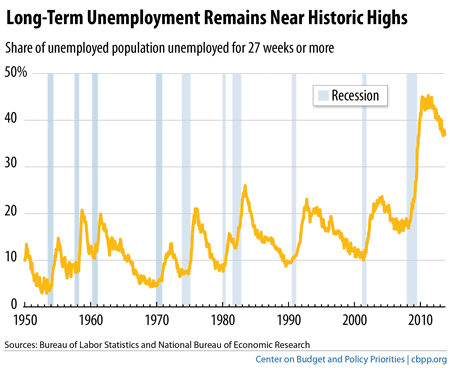BEYOND THE NUMBERS
Hardship in America, 2013: Unemployment Benefits for Long-Term Jobless Set to Expire
The slow economic recovery continues to take a toll on workers. The share of the population with a job, which hit 62.7 percent at the start of the Great Recession in December 2007, has remained below 60 percent since early 2009 and dropped to 58.3 percent in October.
Many jobless workers — 4.1 million people, or 36.1 percent of the unemployed — are now considered “long-term unemployed,” having searched for work for 27 weeks or longer (see chart).

Hardship among American households has risen in recent years, as we explained earlier in this series. Unemployment, especially long-term unemployment, makes it harder for workers to pay for such basic needs as rent, heat, electricity, and food.
Unemployment insurance (UI) has helped many of these workers fill the gap. UI benefits kept 1.7 million people — jobless workers and their families — above the official poverty line in 2012, according to Census figures.
But that’s 600,000 fewer than UI kept out of poverty in 2011 and 1.5 million fewer than in 2010 — and the number is set to fall even further at the end of the year unless the President and Congress act.
That’s because the federal Emergency Unemployment Compensation program (EUC) is scheduled to expire at the end of the year. And when it does, benefits to its recipients — the long-term jobless — will end abruptly.
The program provides additional weeks of UI to people who have exhausted their regular state benefits (typically after 26 weeks), helping to relieve hardship among those jobseekers and their families. (It’s also widely recognized as one of the most cost-effective measures for increasing demand and stimulating job creation in a weak economy.)
To be sure, EUC has lasted longer, helped more unemployed workers, and paid out more in benefits than similar programs enacted in past recessions. But that's because the recession’s blow to the economy was so much worse.
Ending unemployment benefits for the long-term jobless won’t help them find jobs or boost the economy. In fact, it’s likely to do just the opposite, reducing their spending power, thereby further slowing already weak job growth and increasing hardship for struggling American families.
